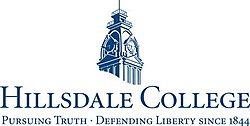Hillsdale College, established in 1844, is a private liberal arts college located in the quaint town of Hillsdale, Michigan. With a student population typically numbering around 1,500, Hillsdale stands out for its intimate campus atmosphere and commitment to classical education. Throughout its history, the institution has prided itself on upholding strong principles of independence and traditional values, refusing federal or state taxpayer subsidies for its operations, including student grants and loans.
Distinguished by its staunch dedication to the principles of a classical liberal arts education, Hillsdale College offers a unique curriculum anchored in the Western philosophical and cultural tradition. Notably, it mandates all students to complete a core curriculum grounded in the Great Books and the U.S. Constitution. Hillsdale is also recognized for its conservative leaning, with the Hillsdale College Public Policy programs and its publication, "Imprimis", a monthly speech digest, gaining national attention. The college operates the Allan P. Kirby, Jr. Center for Constitutional Studies and Citizenship in Washington, D.C., extending its educational reach to the nation's capital.
Devoted to academic excellence, Hillsdale College frequently scores high on various college rankings for its liberal arts programs. It's known for fostering a strong sense of community and for its influential speakers series, which regularly draws notable intellectuals and public figures to share insights with students and faculty alike. The campus is brimming with clubs and organizations that drive positive action, both within the college and in the surrounding community, reinforcing the college's ethos of developing well-rounded characters committed to the greater good.
However, Hillsdale College's approach is not without its criticisms and challenges. Its refusal of government funding, while solidifying its independence, also means students cannot use federal financial aid, potentially limiting accessibility for those with financial constraints. The college's emphasis on traditional values and conservative ideologies may not appeal to all prospective students, possibly affecting the diversity of viewpoints and experiences on campus. Furthermore, the college's rural location, while picturesque, might not offer the cultural and social opportunities found in a larger, more urban environment, which could be a disadvantage for those seeking a vibrant city experience coupled with their education.



